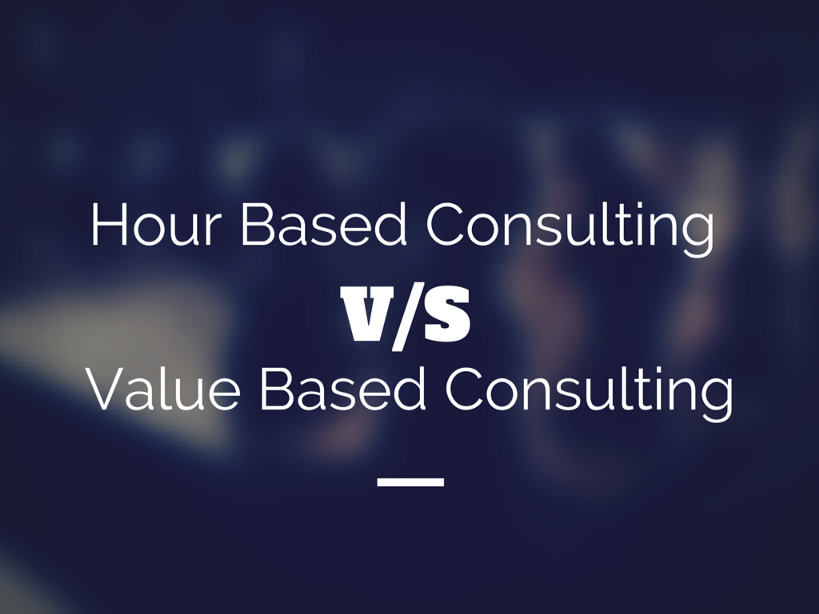In the consulting industry, most of the consultants charge their clients on hourly basis. Hour based remuneration is easy to calculate because there is a direct relation between time and income. Whereas charging the clients on the basis of value added is not easy. Quantifying the value added by the consultant in terms of money is extremely complex task.
But what makes it necessary to consider value based approach is the transparency of the method. Hour based pricing may not involve fair participation of the consultant. Value based pricing on the other hand ensures the clients that they are paying only for the value added and are not wasting their money by number of hours.
Be that as it may, it depends on the circumstances of each case to adopt the most suitable method. It also depends upon the clients. Clients who don’t want to get indulged in the complicated calculations of value, prefer to stick to the hour based method. Whereas clients who are innovative and have a need to ascertain value in order to take risks, would prefer the value based pricing.
Value Based Pricing and It’s Limitations
Value based pricing means the consultant will be paid on the basis of value added by him to the projects. The Value can be defined as the benefits derived out of the services of the consultant. In addition, the value also includes various intangible benefits that are not directly identifiable.
Not all the businesses benefit from the services of an outside consultant necessarily. Each business owner wants to know whether they are actually gaining something by employing the outside consultant. For this purpose, it becomes pertinent to adopt value based method as an alternative approach.
However, the Identification and calculation of value is a big hurdle in value based pricing method. This is what makes this useful method complicated and sometimes impractical. Below are some of the major obstacles that hinder the process of value ascertainment:
- Calculation of Value: Identification and calculation of value is very difficult. This is because value is highly subjective. Value is open to various interpretations and perspectives. To ease the process of value calculation, it must be decided in advance between the client and the consultant that which factors should be taken into consideration while calculating the value and which factors are to be ignored.
- Time of Calculation of Value: Payment terms between the consultant and the company are determined in the beginning of the contract. Whereas value added by the consultant can only be calculated after the delivery of consulting services. Further, in some projects, the services of the consultant bear future benefits and value added by the consultant is realized at a later date. Because of this, it becomes difficult for the client and the company to agree on terms of value. This becomes another hindrance in the path of value calculation.
- Value is Defined by the Clients: There are various consultants who do not prefer to charge on the basis of value. Not because they are doubtful about their skills but because in all the cases, value is perceived and defined by the clients. After the consultant has delivered the services, it is up to the clients most of the time that which elements they take into consideration while calculating the value.
The Answer is Both!
Neither of the two pricing methods is perfect and absolute. The hour based method remains the most popular and trouble free method for charging the clients; but it doesn’t display fair involvement of the consultant and the value added. On the other hand the limitations and complications of value based method are even worse than that of the hour based method.
Nevertheless, there are merits and demerits to both the types of methods. Therefore, the only solution to this tricky question would be to follow pricing strategies that include both value and hour based methods. Below are some alternate solutions to this problem:
- Flat Rate Plus Performance Based Incentives: This method includes both the hour based as well as value based pricing. The payment terms and the hourly rate are predetermined between the consultant and client in the initial stage of the contract. The consultant is first paid by hourly basis at a rate lesser than what consultant usually charges. Secondly, the consultant is awarded performance based perks for the value added by him. This certainly inspires the consultants to focus on value addition in their clients’ business. However, it is quite difficult to explicitly mention the “value” in terms of the contract between the consultant and the company. Therefore, the clients and the consultants are advised to decide what constitutes value, in advance.
- Risk Sharing with the Clients: Risk sharing agreement is another alternative that interests most of the clients. Clients are always willing to share the risks with the consultant in a project. The risk sharing method is also beneficial for the accomplished and established consultants, who know in what ways their services have been adding value to the business of their previous clients. But the limitation of risk taking method is that it cannot be applied in all the circumstances. Consultants cannot share risk with all their clients. Consultants are interested in the risk sharing approach only if their clients have a robust business model and a skilful team of in-house resources, willing to work in close cooperation with the outside consultant.
All clients want from the consultants is results and fulfillment of the purpose for which the consultant is hired.
In long-term client-consultant associations where trust is the most important factor, the clients seldom care about the alternative pricing method if the consultant is performing upto the expectations. Clients want results and fair involvement of the consultant. The results and authenticity of the consultant are important more than any pricing method to the client.



